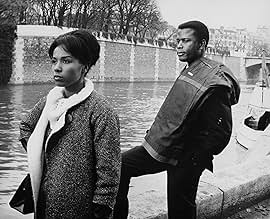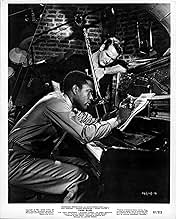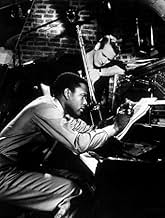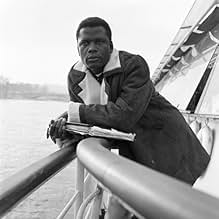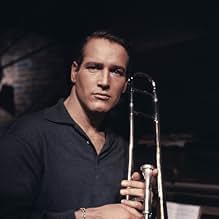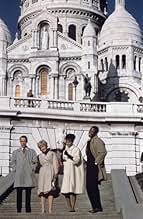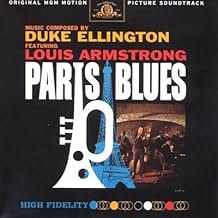ÉVALUATION IMDb
6,7/10
4,1 k
MA NOTE
Dans les années 1960, deux musiciens de jazz américains expatriés vivant à Paris rencontrent et tombent en amour de deux touristes américaines.Dans les années 1960, deux musiciens de jazz américains expatriés vivant à Paris rencontrent et tombent en amour de deux touristes américaines.Dans les années 1960, deux musiciens de jazz américains expatriés vivant à Paris rencontrent et tombent en amour de deux touristes américaines.
- Nommé pour 1 oscar
- 2 nominations au total
Guy Pedersen
- Bass Player
- (as Guy Pederson)
Roger Blin
- Guitarist Fausto the Moor
- (uncredited)
Charles Bouillaud
- Luggage Carrier in Train
- (uncredited)
Michel Dacquin
- Guest at Devigne's Party
- (uncredited)
Hélène Dieudonné
- The Pusher
- (uncredited)
Michel Garland
- Club 33 Customer
- (uncredited)
Histoire
Le saviez-vous
- AnecdotesPaul Newman was coached in playing the trombone by Billy Byers, while the playing for Newman on the soundtrack was done by Murray McEachern. Sidney Poitier's tenor sax playing was done by Paul Gonsalves. The soundtrack was recorded May 1-3, 1961 at Reeves Sound Studios in New York City.
- GaffesSome may believe that the mouthpiece ligature on the tenor saxophone that Eddie Cook (Sidney Poitier) plays is upside down. However, in the first scene when the band is playing, it can be seen that the thumbscrew that adjusts the ligature is on the bottom, where it normally would be. It is, therefore, not upside down.
- Générique farfelu"Introducing" Serge Reggiani, who by 1961 had been in French films for 20 years and a star at least throughout the 1950s.
- ConnexionsFeatured in A Century of Black Cinema (2003)
- Bandes originalesTake The 'A' Train
(uncredited)
Music by Billy Strayhorn
Recorded at Reeves Sound Studios, New York on May 2 & 3, 1961.
Label - United Artists
Commentaire en vedette
Within 2 years of "Paris Blues" being released the US involvement in Vietnam began to sour the relationship between America and la rive gauche. French intellectuals affected to disdain the United States and all its works;one of the few aspects of Americana that were permitted to be still admired was jazz music. Even so the myth of the American jazz musician as a god-like figure had faded by the mid sixties.Giants like Louis Armstrong and Duke Ellington were still revered but the journeymen jazzers like Ram Bowen(Newman)no longer filled the clubs just because they were American. The Indian Summer of America's honeymoon with Europe peaked with "Paris Blues".
Beautifully shot in black and white in the quintessentially Parisian parts of the city where the 2 pairs of lovers could stroll hand in hand photogenically it was a love letter to the arondissements beloved of Scott Fitzgerald,Hemingway and Gertrude Stein 30 years after the affair had ended.
Paul Newman was never more charming,Sidney Poitier never more cool and self-effacing;their pairing considered quite daring at the time coming just a few years after the ground-breaking "The Defiant Ones". Duke Ellington wrote the score and his "Mood Indigo" is beautifully played by Murray McCeachern.Louis Armstrong plays himself - why his character is named Wild Man Moore one can only speculate.
I saw "Paris Blues" when I was 20 years old and my love affair with jazz was a its height. Looking at it now it doesn't seem all that special,the characters and situations have all become clichés;but perhaps that's a bit like saying "Hamlet"'s a good play but it's full of quotations.
Beautifully shot in black and white in the quintessentially Parisian parts of the city where the 2 pairs of lovers could stroll hand in hand photogenically it was a love letter to the arondissements beloved of Scott Fitzgerald,Hemingway and Gertrude Stein 30 years after the affair had ended.
Paul Newman was never more charming,Sidney Poitier never more cool and self-effacing;their pairing considered quite daring at the time coming just a few years after the ground-breaking "The Defiant Ones". Duke Ellington wrote the score and his "Mood Indigo" is beautifully played by Murray McCeachern.Louis Armstrong plays himself - why his character is named Wild Man Moore one can only speculate.
I saw "Paris Blues" when I was 20 years old and my love affair with jazz was a its height. Looking at it now it doesn't seem all that special,the characters and situations have all become clichés;but perhaps that's a bit like saying "Hamlet"'s a good play but it's full of quotations.
- ianlouisiana
- 3 nov. 2005
- Lien permanent
Meilleurs choix
Connectez-vous pour évaluer et surveiller les recommandations personnalisées
- How long is Paris Blues?Propulsé par Alexa
Détails
Box-office
- Brut – États-Unis et Canada
- 1 300 000 $ US
- Durée1 heure 38 minutes
- Couleur
- Rapport de forme
- 1.85 : 1
Contribuer à cette page
Suggérer une modification ou ajouter du contenu manquant

Lacune principale
By what name was Paris Blues (1961) officially released in India in English?
Répondre

